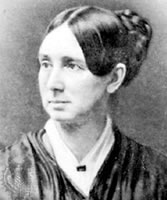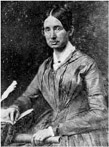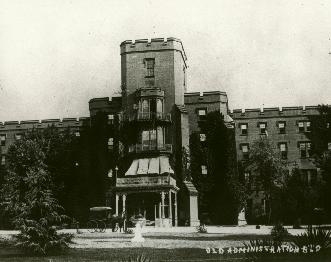 |
| Dorothea Dix |
When you see the word hero, who do you think of? A friend? A relative? Maybe even someone that you have never met. Well, to me, a hero is someone who does something to improve the life of someone else, without worrying about the consequences. When asked to write about a hero from the 19th century, I knew exactly who I was going to write about: my hero, Dorothea Lynde Dix. Dorothea was born on April 4, 1802, in Hampden, Maine. She spent most of her childhood in Worcester, Massachusetts, and later moved to the home of her wealthy grandmother in Boston. She started displaying her tender, nurturing ways as a child, when she tended to her younger brothers and ill mother. By the age of 14, she had started a school to teach young children how to read and write. As she grew older, she tried out many careers such as a schoolteacher, governess, and writer, but she struggled to find a niche where she really belonged. She did find, though, that she enjoyed teaching, and even when she was ill, which was rather often, she would still teach as much as she could. She once said, "I think even lying on my bed I can still do something."
As her life went on, Dorothea mainly stayed in the State of Massachusetts, taking teaching jobs and helping out any way that she could. Then, in March of 1841, Dorothea took a job teaching Sunday school to a group of women who were prisoners at a jail in East Cambridge, Massachusetts. What she saw there would fuel her need to help people for the rest of her life. The women prisoners, who were mentally ill, were kept in a freezing, dirty room. There was no heat, no proper clothing, and no real bedding. When asked about it, the prison staff retorted that the "insane," in their opinion, could not feel heat or cold. This outraged Dorothea. She had no previous medical training, but she knew that no human should have to deal with those conditions, and she didn't agree with the belief that the mentally ill could not be cured or should be put away in asylums and prisons.
 |
| Dorothea Dix |
Dorothea went to court with what she saw at the prison, and because of that the conditions there improved. Dorothea then saw that she had the power to change the lives of those who were mentally incapacitated, and traveled around the country, inspecting prisons and other places for the mentally ill. She soon won the support of the lawmakers, who began to set aside money to establish a place for the mentally ill that would not be part of the state's prison system. She inspected prisons and asylums all around the country, and described to lawmakers the terrible conditions that she discovered inside. Over her lifetime, she covered over 30,000 miles and played a key role in the opening of 32 mental hospitals. Later in her life, during the Civil War, she once again demonstrated her nurturing ways by working as a nurse in the war. Even after the war, she continued to campaign for the rights of the mentally insane, and was still doing so when she died. On July 17th of 1887, Dorothea Lynde Dix died in a guest room of one of the hospitals that she helped establish.
In my opinion, Dorothea Dix fits my definition of a hero because she not only did something to improve the life of one person, she improved the lives of thousands, without worrying about the consequences of her actions. That day when she went to teach Sunday school in East Cambridge, she could have done nothing about the terrible conditions that the prisoners had to endure. She could have chosen to ignore them. But instead, she let her courageous and nurturing ways take over, and she campaigned for the rights of those prisoners. She set out to achieve what no one else had bothered to do: give a good life to the insane. She knew that they were still human, no matter what ailment they had. She went to the courts, despite the fact that she was a woman, and she was fearless of the ridicule that she might face when she tried to help those people. She stood up for what she believed in and gave it her all, and that is what makes her a hero to me and to the thousands of people that she saved.
 |
| Dorothea Dix Hospital for the Insane (civilwarmed.org) |
Dorothea Dix has left a strong legacy. Without her, people might still be locking up the blind, the deaf, the retarded, and the insane. Because of her work as a philanthropist, humanitarian, and rights activist, 32 hospitals were built, lives were drastically improved, and people were educated on how to treat the mentally insane. She taught us that everyone should be treated equally, and that everyone has his or her own right to be treated fairly, and not to be looked down upon because of their physical or mental incapacitation. That is her legacy, and that is why she is a hero. If Dorothea had any words of wisdom to offer to the youth of today, I would imagine that she would say this: Never second guess yourself, because one person can change the world, just like I did. With all the issues going on today, such as the energy crisis and the war, I think that Dorothea Dix is a great inspiration to everyone because she demonstrates that one person can change the world, with a whole lot of willpower and a little bit of luck.
Page created on 9/5/2008 12:00:00 AM
Last edited 10/17/2019 8:27:39 PM
